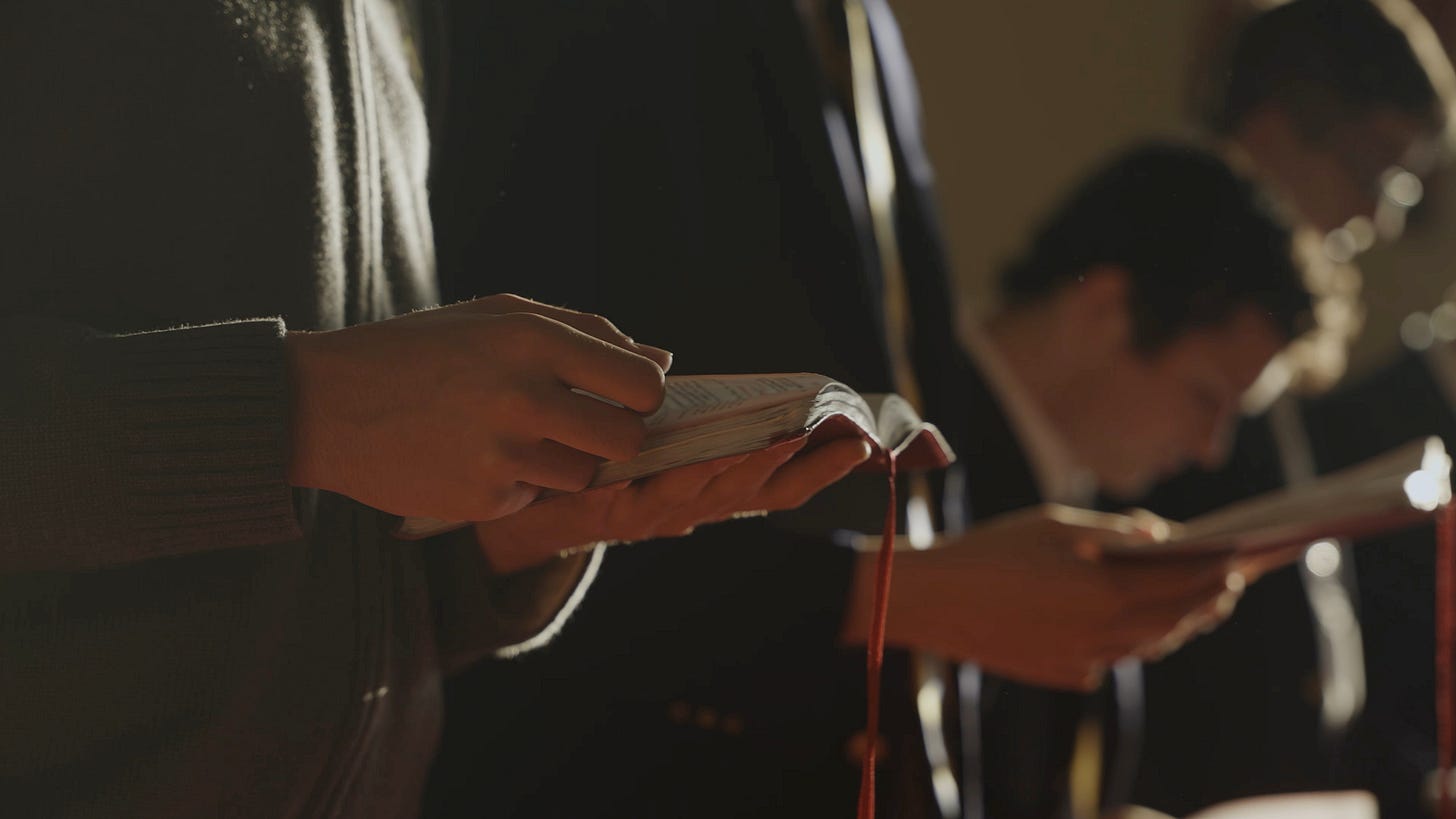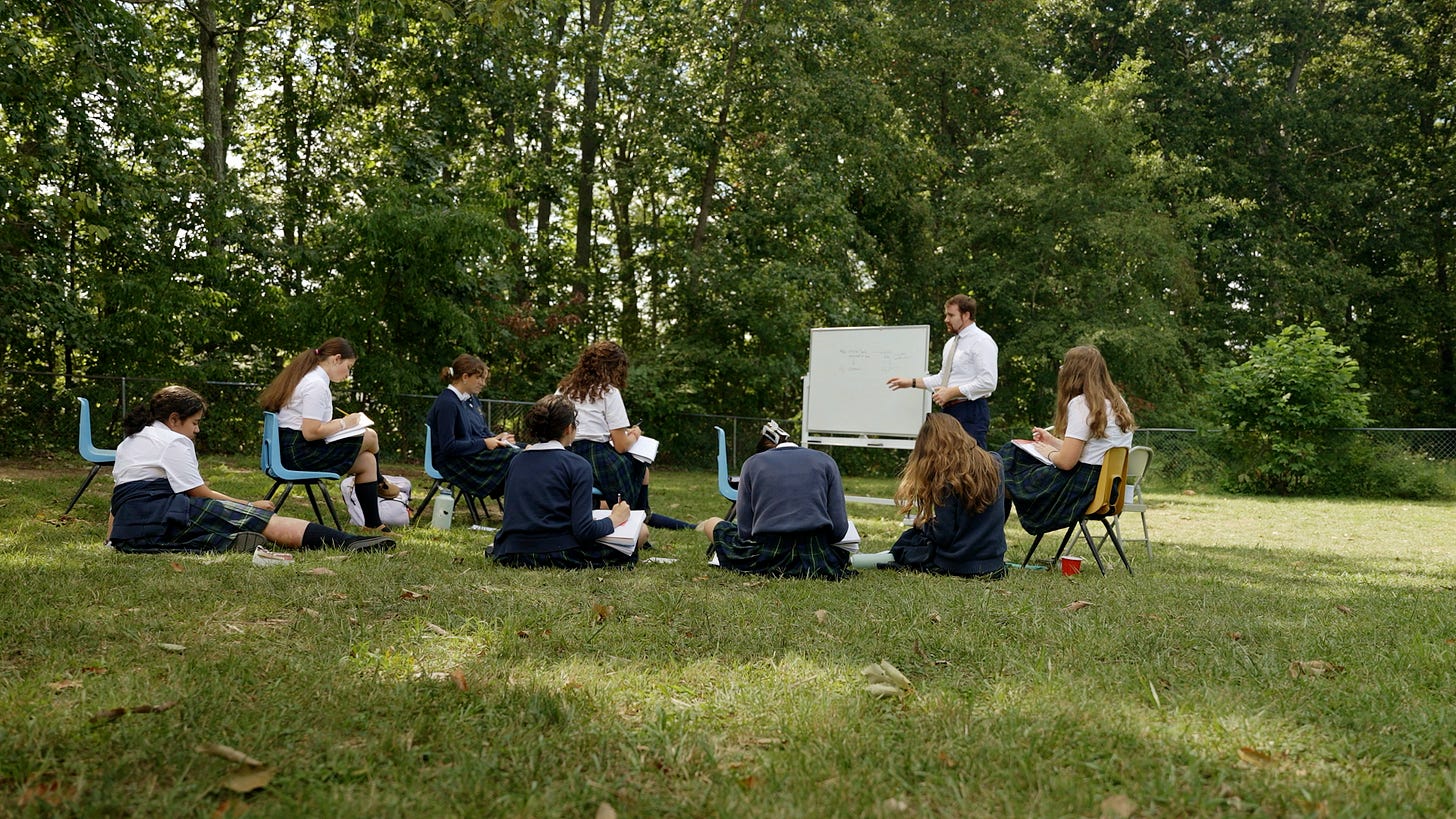Post IX: Onward and Upward
The Annual Fund takes off, Shakespeare comes to The Summit, and faculty updates
Welcome back to A View from The Summit. The Summit Academy is a classical liberal-arts school rooted in the Catholic tradition, located in historic Fredericksburg, Va., serving students in grades 6-12. This newsletter informs readers about our school and the ways in which it is helping renew education and the Church.
I want to welcome the new subscribers who have found us through other newsletters. Classically focused publications are growing alongside the explosive rise in classical schools. We hope to distinguish our newsletter with our unique combination of on-the-ground updates and school-governance insights.
A recent market analysis of classical K–12 education estimates a national average 4.8 percent annual growth rate in new like-minded schools—not enrollment growth within existing schools, but a total increase in newly established ones. To provide some context, the annual growth rate of new Starbucks stores across North America is less than 3 percent. That comparison isn’t totally apples to apples, but consider that Starbucks can scale far more efficiently than a group of patch-worked classical schools. It’s safe to say that the demand for classical education likely won’t be cooling anytime soon. The more, the merrier!
Administrative Review:
Faculty updates
The fundamental question of schools such as ours is one of vocation: Are we preparing students for their vocations? We do not usually consider that we are also supporting the vocations of our faculty. I’m excited to share that in the past month, among our faculty and their families, we’ve had two babies and one wedding. (Congratulations to the Pepe, Candler, and Clark families.) We are also launching a 403(b) retirement plan this month with an initial employer contribution for all participants. And, we are hiring for new positions in the middle and upper schools. Please email me at nmarr@thesummitva.org if you or someone you know is interested.
Annual Fund update
The launch of our Annual Fund is underway. We have not led a fundraising effort during the spring semester before—most contributions have come during the annual fall gala—but in just a few weeks, we’ve raised more than $26,000 towards operating expenses. We’ve received gifts from people in Virginia, Maryland, New York, Illinois, Florida, and more. What’s more, several donors have doubled their largest gifts. We are grateful and humbled by the outpouring of financial support for our students, faculty, and programs. This support is especially important as the year draws to a close. Tuition revenue only gets us so far.
If you are in a position to do so, please considering donating to The Summit Academy’s new Annual Fund. There are several ways to give:
You can donate by credit, debit, or bank transfer using our secure online portal.
You can send a check addressed to The Summit Academy to 7124 Salem Fields Blvd PMB#157, Fredericksburg, VA 22407.
You can donate appreciated stock, which can facilitate tax savings.
You can make a qualified retirement distribution. Please email nmarr@thesummitva.org to discuss.
Establishing the Annual Fund—a year-in, year-out fund for operations—provides the confidence we need to pursue campus-building plans. With an Annual Fund in place, we and our major donors can prepare to invest heavily in the building project, which will require us to raise several million dollars.
The Summit’s Spring Play
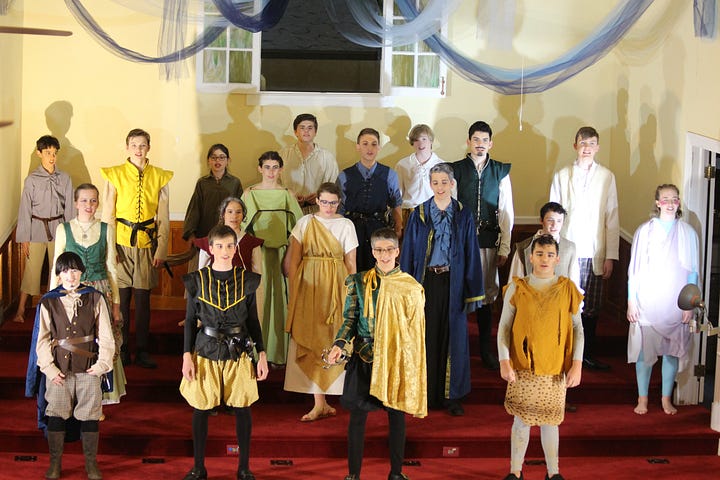
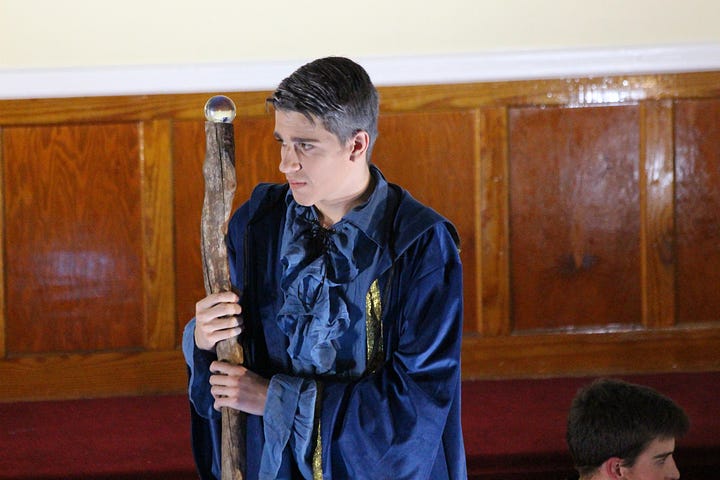
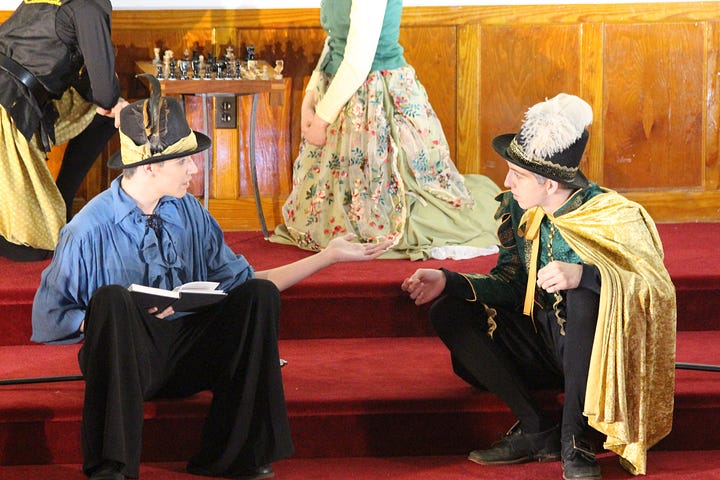
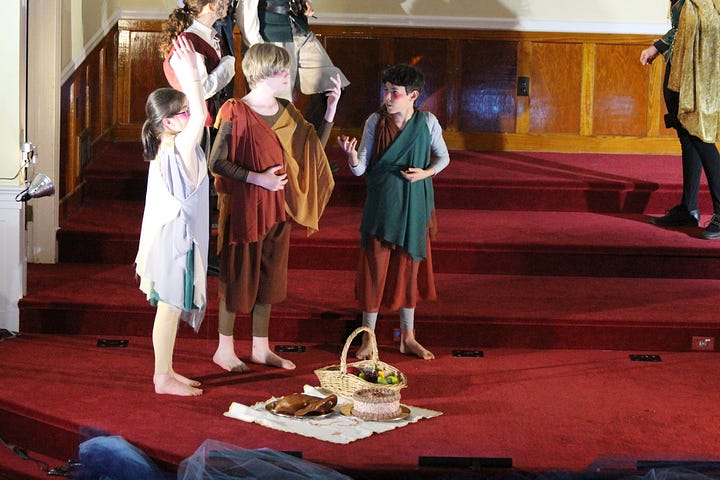
Before Easter break, The Summit’s drama department hosted a wonderful production of The Tempest. Mr. Patrick Clark, our talented history teacher and play director, reflects:
After two successful theatrical productions at The Summit, and warm responses from our school families and friends, it was clear that our student artists were ready to take on Shakespeare. Students read and discuss Shakespeare’s drama and verse in their literature courses, but actually staging his plays and encountering them as audience members is also an essential part of any liberal arts program.
When we announced The Tempest, the response was electric. Dozens of students signed up to audition and many others volunteered to work backstage and house crew. It was also the first time The Summit produced a play including student artists from both the middle and high School. Student volunteers performed on stage, ran sound and lights, managed props, designed the poster, and spread the word about The Tempest to the local community.
In addition to the hard-working cast and crew, I would like to thank the Arnold, Apa, Harding, Traylor, and Rogers families. Without your volunteer hours and incredible commitment to our Speech & Drama Department, The Tempest would not have been the success it was.
I hope to see our Summit families and friends at future Speech & Drama performances. Keep a weather eye on the horizon!
Faculty & Curriculum Insight:
This week’s faculty reflection is from Mr. John Piescik, our dean of student life and a founding faculty member. He graduated from the Franciscan University of Steubenville with a B.A. in theology and philosophy, and he has since earned his M.Ed. in Administration & Supervision from Marymount University. Mr. Piescik teaches Latin courses for all grade levels, as well as a New Testament course and several elective courses. In addition to his classroom experience, Mr. Piescik has served as our gala emcee. He and his wife Kathryn have six children.
After teaching language for seven years one of the questions I have become accustomed to asking my new students is: Do you know where the dictionary is kept in your home? I always get a range of responses. Some students are able to rehearse the path they take from their favorite reading spot to the precise place on the shelf where it sits. Others say that they just use their smartphones when they need to look up the definition of a word. The rest are somewhere in the middle, aware of a dictionary’s presence in their homes but never cracking the cover themselves.
I encourage people to think about dictionaries because in popular consciousness they are becoming obsolete—one more example of a tool being replaced by electronic devices which can access the vast array of pre-programmed online word search engines. As the devices become more available to younger students, the utility of owning a paper dictionary comes into question. The convenience of the electronic version of the tool is undeniable, but this is a big part of why the paper tool ought to be taught in the home as well as in the school.
The process of typing a word into a search engine as opposed to the process of flipping through a large book is truly effortless. Only the word as it appears is entered and only the definition of that one word is returned, and the exchange does not cause the searcher to undergo even minor inconvenience. Sifting through pages of words to find the one which corresponds to the similar word in front of a student leaves an impression in both memory and attitude. The moment of suffering experienced from the lack of knowledge and the process of seeking and finding creates neural pathways affecting a person’s memory and understanding.
It also opens up students to a whole world of interrelated words and makes them comfortable with the idea of spending time searching for an answer instead of becoming anxious in the absence of instantaneous feedback. Virtual dictionaries attempt to simulate these features of a real one, but unsuccessfully; as soon as the information is apprehended, hardly any student would remain looking at the website, discarding it from his or her memory along with the memory of having to look the word up in the first place.
But why would using a paper dictionary appeal if it only promises a more difficult version of what a smartphone can do? The dictionary requires more thought, more user input. It makes those who use it more thoughtful and not less. It gives its users agency, equipping them with words and making them more confident, rather than more dependent and less aware of words generally. It is similar to teaching a boy to use a screwdriver before allowing him to use a power drill. If he understands what the drill does and what it is for by having to first do the work of the drill manually, he will not only be more effective in his use of the tool, but also more creative and safe in his handling of it. He knows the power of the drill and respects it, because he has felt the pain of twisting his hand over and over again to tighten a screw or a bolt. A power drill has much more potential to do damage in the hands of a child than a screwdriver, just as the use of a smartphone or laptop to do their work carries the potential to expose children to pornography, dangerous ideology, and toxic social media.
I am not advocating that we as a society return to using only manual screwdrivers, or indeed that we stop using smartphones and online dictionaries. These devices can be deployed effectively and thoughtfully in the service of worthy endeavors. But the training to use these tools should begin with the training of the person to be thoughtful and intentional, and to use tools that foster these qualities and prepare them for further development.
Co-Curricular Highlights:
Senior thesis week is upon us. All seniors will defend their papers to select faculty judges as the rest of The Summit faculty and student body watches. Thesis coordinator James Stanley describes the program this way:
The Senior Thesis, the signature effort of a student’s education at The Summit Academy, is a sustained performance in the liberal arts. It is not a work of specialized research, but the extended pursuit of a difficult question in dialogue with a great author. Texts must be either included in or closely related to the Summit curriculum. Students are encouraged to plumb any of the liberal arts for works they love that raise questions they feel called to pursue. Literary and historical works are, of course, on the table: but so are mathematical proofs, musical scores, and libretti; masterpieces of architecture, sculpture, and painting; theological and philosophical treatises; seminal works of scientific thought; great experiments and inventions; political documents, laws, and encyclicals—anything, in short, with a voice in the “Great Conversation.”
I’ll be judging a paper written about Flannery O’Connor’s “A Good Man is Hard to Find.” O’Connor’s obscure brilliance is clear throughout, and I’m excited to discuss. Other senior theses this year include a deep dive into Mother Theresa’s private letters, a Thomistic analysis of A Man for All Seasons, a close reading of Karol Wojtyla’s play The Jeweler Shop, and an evaluation of Cardinal Ratzinger’s Spirit of the Liturgy.
More about reading. Our humble library represents the love of learning we hope to instill—and its lengthy check-out sheet for the books suggests that we’re doing so well. So much of the world is contained within the witty prose of Jane Austen or the moral complexity of Dostoevsky’s novels. Still more of the world is contained within fairytales, and for those interested, I commend this essay on fairy stories written by J.R.R. Tolkien. When I see books checked out of a library in a school like ours, which assigns a significant amount of required reading, I’m reminded of the joy of learning.
What I’m Reading Now:
Our parent reading group on Prudence by Fr. Gregory Pine, O.P. was a great success. The book gives a clear, accessible explanation of virtue, prudence, and the place of prudence in our lives. Pine provides reflection questions at the end of each short chapter. Our discussion could have continued long after the scheduled 90 minutes. I highly recommend this book to other classical educators leading parent reading groups.
I’d recommend Archbishop Chaput’s article, “In the Courts of Three Popes: An Insider’s Insight.” A review of Mary Ann Glendon’s new book by the same title, the article emphasizes our role as lay people in the renewal of the Church. Archbishop Chaput writes:
Faithfully living what we claim to believe as Catholic Christians shapes the future. And the fact is, we can no longer afford a sclerotic Church, a comfortable Church, a get-along Church. We need to be a confessing Church, not just in our diocesan structures, but in the pews and family homes of every parish. We now really do live, as Glendon says, in “the hour of the laity.” And the Church and her mission really do depend on zealously committed laypeople to turn words like “the new evangelization” from a pious slogan into the active witness of their lives.
A confessing Church is one that knows it is sinful, one that knows it needs redemption, and one that pursues grace relentlessly. It’s one that is not scared to confront its demons and one that doesn’t recoil at the workings of grace. It’s one that wants to heal more than it wants to feel secure.
Indeed, what Chaput doesn’t commend is that false security which is the appearance of holiness. What he doesn’t say is that laypeople should look as though they are good, and that their appearance will win over souls. Maintaining appearances is far easier than the real conversion of our hearts, but it’s real conversion that is so urgently needed. It’s when we are weak, St. Paul teaches, that we are strong.
Last weekend, I finished Willa Cather’s My Ántonia. It’s one of the best books I’ve ever read. Cather’s prose is wonderfully detailed, her storytelling captivating, and her character development excellent. Most striking is her ability to convey beauty. The book’s introduction is so beautiful that it moves one to tears, and the beauty only begins there. Let’s look everywhere and always for beauty.
If you are enjoying this newsletter, please consider subscribing via the button above and sending it along to others who might be interested. Revenue from paid subscriptions will support The Summit Academy of Central Virginia.


